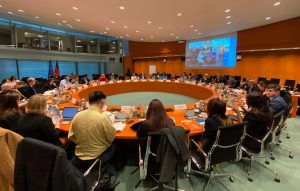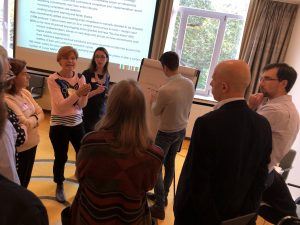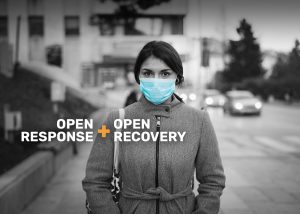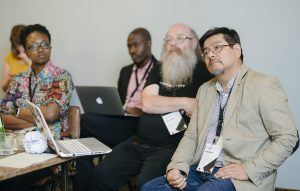Faces of Open Government: Cesar Nicandro Cruz-Rubio
Rostros del gobierno abierto: César Nicandro Cruz-Rubio
OGP’s Independent Reporting Mechanism (IRM)The Independent Reporting Mechanism (IRM) is OGP’s accountability arm and the main means of tracking progress in participating countries. The IRM provides independent, evidence-based, and objective ... is applying changes to the way it operates to make the IRM more simple, fit for purpose, results-oriented, and prioritized. Cesar Nicandro Cruz-Rubio, member of the Independent Experts Panel of the IRM, explains what these changes mean for the open gov community and provides an update on how the IRM is adapting to the COVID-19 pandemic.
1. As OGP approaches its ten year anniversary, we’ve seen commitments tackle a range of issues at different levels of government, some more ambitious than others. Where have you seen progress made in open government?
Over the years, OGP members have found ways to strengthen their co-creation processes by integrating effective participation and cross-sector collaboration with the active use of open dataBy opening up data and making it sharable and reusable, governments can enable informed debate, better decision making, and the development of innovative new services. Technical specifications: Polici... and public information. As a result, better commitments have been proposed and implemented. Members like the Basque Country, Chile and Argentina have also strengthened their interaction and collaboration with civil society organizations, finding in OGP an effective and unique platform to do it.
OGP members have also strengthened deliberative democracy in their countries through national action plans and multi-stakeholder forums (MSF), institutionalizing the open government agenda in the process. In some countries like Spain this democratic innovation is the only operational and participatory space at the national level. OGP MSFs have proven to have the power to invigorate democratic institutions in OGP participant countries and local governments to actually go “beyond the ballot box“. This model could even be used as a way to conduct or improve global priority agendas like the Sustainable Development GoalsOGP countries are experimenting with open government innovations to accelerate progress on the Sustainable Development Goals, particularly SDG 16+ which includes peaceful, just and inclusive societies....
To effectively run the open government “equation”, we must go beyond single-action and short-run strategies to include several medium-run innovative designs and open policy strategies. The case of the Buenos Aires “open government ecosystem” – is in my view – a clear example of this.
2. Following the OGP Steering CommitteeThe Steering Committee is OGP’s executive decision-making body. Its role is to develop, promote and safeguard OGP’s values, principles and interests; establish OGP’s core ideas, policies, and ru... endorsement of the IRM Refresh in early 2020 and given the onset of the COVID-19 pandemic, how is the Independent Reporting Mechanism (IRM) adapting and responding to support countries and open government reforms? And what are some of the changes in the IRM you are most excited about and how will they contribute to OGP’s three year vision?
The endorsement of the IRM refresh is aimed at increasing the relevanceAccording to the OGP Articles of Governance, OGP commitments should include a clear open government lens. Specifically, they should advance at least one of the OGP values: transparency, citizen partic... of the IRM and making the assessment process more agile. The work of the IRM is a priority for OGP and needs to be reoriented to
- maintain its functions of accountability and learning through quality, evidence-based reporting,
- offer timely findings and recommendations to increase the opportunities to promote high-value policy reforms and effect change, and
- make the reporting process more accurate to keep its relevance and to increase the use of IRM findings to influence changes in policy. In sum, to make it simpler and more usable for key audiences. As a colleague from the International Experts Panel (IEP)As an independent body, OGP’s Independent Reporting Mechanism (IRM) is guided by, but not directly accountable to, the OGP Steering Committee. Instead, the International Experts Panel (IEP) directly... says: the right information, at the right time, in the right way.
The implementation of the IRM Refresh is on track despite COVID-19 disruptions. The IRM is preparing to begin a phase of targeted outreach to validate and get some user-feedback on specific refresh products and indicators. The IRM will continue to assess the evolving scenarios affecting OGP processes to inform refresh products, roll-out plans and the transition process into the new products.
The effective use of open government principles can not only help us save lives during the pandemic, but can also help us improve public spending, spaces for participation, accountability in public procurementTransparency in the procurement process can help combat corruption and waste that plagues a significant portion of public procurement budgets globally. Technical specifications: Commitments that aim t... More, and transparencyAccording to OGP’s Articles of Governance, transparency occurs when “government-held information (including on activities and decisions) is open, comprehensive, timely, freely available to the pub... More measures to ensure effective and early responses. Adapting commitments in a COVID-19 context can potentially increase the impact and importance of commitments.
3. What opportunities, challenges, and recommendations do you see for OGP members in using an open gov lens in their response and recovery efforts to the COVID-19 pandemic?
Now is the best time to demonstrate the power of openness. There is a clear and valid opportunity to incorporate open government principles in key actions and policies to fight the COVID-19 crisis, and in doing so, revamp democracy and protect civic liberties that are currently at risk. These could include:
- Open strategies for urgent public procurement procedures (e.g. citizen oversight mechanisms such as the one in Dominican Republic)
- Transparency policy around key decision-making processes
- Promote horizontal accountability and overseeing mechanisms
- Crowdsource talent, capacity, and citizen knowledge (such as Frenalacurva.net, used by several OGP members)
- Policies to protect those in vulnerable situations during confinement (including gender-based violenceReforms that combat gender-based violence are essential for fostering an inclusive society and government that respects human rights and promotes gender equality. Technical specifications: Commitments... More, poverty risk, small business bankruptcy, etc.)
El Mecanismo de Revisión Independiente (IRM por sus siglas en inglés) de OGP está aplicando cambios en la forma en que opera para hacer que el IRM sea más simple, adecuado para el propósito, orientado a resultados y priorizado. César Nicandro Cruz-Rubio, miembro del Panel de Expertos Independientes del IRM, explica qué significan estos cambios para la comunidad de gobierno abierto y brinda una actualización sobre cómo el IRM se está adaptando a la pandemia de COVID-19.
OGP se está acercando al décimo aniversario de su fundación. Hemos visto compromisos que atienden diversos temas a diferentes niveles de gobierno, algunos más ambiciosos que otros. ¿En qué áreas has visto avances de gobierno abierto?
A lo largo de los años, los miembros de OGP han identificado mecanismos para fortalecer sus procesos de cocreación al integrar la participación efectiva y colaboración intersectorial con el uso de datos abiertos e información pública. Como resultado, se han propuesto e implementado compromisos de mejor calidad. Algunos miembros como el País Vasco, Chile y Argentina han fortalecido su interacción y colaboración con las OSC y para ello han encontrado una colaboración y plataforma efectiva en OGP.
Además, los miembros de OGP han fortalecido la democracia deliberativa en sus países a través de los planes de acción y foros multisectoriales, institucionalizando la agenda de gobierno abierto en el proceso. En algunos países como España, esta innovación democrática es el único espacio operacional y participativo que existe a nivel nacional. Los foros multisectoriales de OGP han demostrado revitalizar las instituciones democráticas en los países y gobiernos locales de OGP para ir “más allá de las urnas electorales”. Este modelo podría incluso utilizarse como medio para mejorar las agendas globales como los Objetivos de Desarrollo Sostenible.
Para impulsar la “ecuación” de gobierno abierto de forma efectiva, debemos ir más allá de las acciones aisladas y estrategias de corto plazo para incluir modelos de mediano plazo y estrategias de política abierta. El caso del “ecosistema de gobierno abierto” de Buenos Aires, en mi opinión, es un claro ejemplo de ello.
- Tras la aprobación del Comité Directivo de OGP de la actualización al IRM a principios del 2020 y debido al inicio de la pandemia de COVID-19, ¿Cómo se está adaptando el Mecanismo de Revisión Independiente (IRM por sus siglas en inglés) para apoyar a los países y a las reformas de gobierno abierto? ¿Qué cambios del IRM te entusiasman y cómo contribuirán a la visión de OGP a tres años?
La actualización del IRM tiene el objetivo de aumentar la relevancia del IRM y su proceso. El trabajo del IRM es una prioridad para OGP y debe reorientarse para:
- Mantener sus funciones de rendición de cuentas y aprendizaje a través de informes de calidad y basados en evidencias.
- Presentar hallazgos oportunos y recomendaciones para aumentar las oportunidades de promover reformas de alto valor y promover cambios y
- Incrementar la precisión del proceso de informes para mantener su relevancia y aumentar el uso de los hallazgos del IRM para generar cambios de política. En suma, simplificar y los informes y facilitar su uso por audiencias clave. Como lo comentó un colega del Panel de Expertos Internacionales: la información correcta, en el momento correcto y de forma correcta.
A pesar de las interrupciones ocasionadas por el COVID-19, la actualización del IRM se ha realizado según lo planeado. El IRM está preparándose para iniciar una fase de acercamiento para solicitar retroalimentación de los usuarios sobre productos e indicadores específicos. El IRM seguirá evaluando los escenarios que podrían afectar los procesos de OGP para definir los productos, planes y procesos de transición a nuevos productos.
La aplicación efectiva de los principios del gobierno abierto no solo pueden ayudarnos a salvar vidas durante la pandemia, sino que además nos puede ayudar a mejorar los gastos públicos, los espacios de participación, la rendición de cuentas en las adquisiciones públicas y las medidas de transparencia para asegurar la implementación de respuestas efectivas y oportunas. Adaptar los compromisos en el contexto de COVID-19 puede incrementar el impacto y la importancia de los compromisos.
- ¿Qué oportunidades, retos y recomendaciones identificas para que los miembros de OGP puedan aplicar una perspectiva de gobierno abierto en sus esfuerzos de respuesta y recuperación a la pandemia del COVID-19?
Ahora es el mejor momento de demostrar el poder de la apertura. Existe una oportunidad clara y válida para incorporar los principios de gobierno abierto en las acciones y políticas de lucha contra la crisis del COVID-19 y así fortalecer la democracia y proteger las libertades cívicas que están en riesgo. Estas podrían incluir:
- Estrategias abiertas para los procedimientos de adquisiciones urgentes (por ejemplo, mecanismos de supervisión como el caso de la República Dominicana).
- Políticas de transparencia en los procesos de toma de decisiones;
- Rendición de cuentas horizontal y mecanismos de supervisión
- Identificar de forma masiva capacidades y conocimiento ciudadano (como el caso Frenalacurva.net, utilizado por diversos miembros de OGP)
- Políticas para proteger a los grupos en situaciones vulnerables durante el confinamiento (incluyendo violencia de género, riesgo de pobreza, empresas pequeñas en bancarrota).
No comments yet
Related Content

The Steering Committee Lays Tracks for OGP’s Second Decade

IRM Refresh
In 2018, the Independent Reporting Mechanism (IRM) published a Review Report of its work and impact. The report was based on interviews with more than 50 OGP stakeholders and a…

Open Response + Open Recovery
Our community’s fundamental values of accountability, transparency, inclusivity, and responsiveness are vital as we move through COVID-19 response to recovery. Find resources, events and examples from OGP and partners.


Leave a Reply